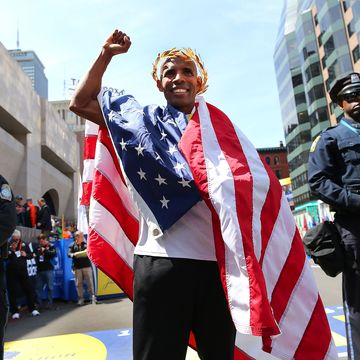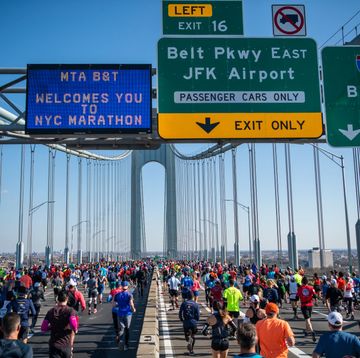Update June 16, 2017: The Portland Marathon issued a brief statement Friday saying the race and the Portland Police Bureau “have met and agreed to work out a great course for the October 8th Portland Marathon. Details making the course even better will be worked out at a later time.”
“We are excited to be working with the Portland Marathon and with other city bureaus to make this happen and to improve our iconic Portland course,” the statement quoted acting police chief Chris Uehara as saying.
One of the country’s oldest marathons is at risk of being canceled this year after failing to secure permits from the city of Portland, Oregon.
A June 9 letter from the Portland Bureau of Transportation (PBOT) to the Portland Marathon said that the city has denied the race’s application for permits for the 46th running of the marathon, scheduled for October 8.
At issue is the number of police available to staff the race’s proposed route.
Only 33 officers will be available for the 2017 race, instead of the 80 it had last year, according to PBOT. Because of the reduction in available officers, the race will need to change its course. The Portland Marathon race director, Les Smith, was advised of the police staffing shortage in a letter immediately following last year’s race.
Transportation and police officials attempted to meet with the marathon officials in hopes of determining changes in the course that could keep it running.
The race didn't respond until it submitted its permit application in May. The application had no modifications from the 2016, event officials said.
Can the race be saved?
Smith told Runner’s World in a phone call that the race is putting together an appeal. “Yes, we will have [the Portland Marathon] in 2017,” he said.
Dylan Rivera, spokesman for the PBOT, said the race was late paying its bill for police services for 2016 and issued payment in April “under protest,” in a letter from the race’s attorney, Michael Kelley.
“It’s hard to know what can be done at this point, unless they’re willing to engage the appropriate city staff on adjustments to the course,” Rivera said in a phone call with Runner’s World. “No one else consistently pays their fees to the city months late with a letter of protest. We work with events week in and week out, large and small, and they are generally extremely responsive and collaborative in working with transportation, police and fire to find common ground.”
RELATED: Three Races End Up Short Due to On-Course Errors
Smith said he was in talks with the mayor’s office to get the race permitted, on the same course it has used for 25 years, for 2017. “We’ve been working at a higher level than PBOT,” he said. “I’m counting on [Portland Mayor] Ted Wheeler.”
A spokesman for Mayor Wheeler told Runner’s World, “I can only say that the message that [Les Smith] is getting from our office is the same message that he is getting from the bureaus, that he has to come to the table and problem solve around ensuring the public safety during the event. There’s a clear path to get us to a marathon. But it’s going to have to take willingness to problem solve on behalf of the race organizer.”
Runners at risk?
The permit denial is the latest in a series of snafus that have plagued the Portland Marathon amid growing acrimony between race officials and city staff. Smith said there is no acrimony on the race’s part.
Conflict arose in the weeks before the 2016 race with Smith and Mamie Wheeler, the race’s medical director, on one side and Portland Bureau of Fire and Rescue staff on the other. That dispute involved the race’s medical operations plan. Tension on race morning over that plan nearly caused public safety officials to shut the race down—after it had already started.
Those were among the points made in an advisory after-action report, written by the race’s course security liaison, in the days after the race. The report was sent to Smith and circulated among various city agencies. Runner’s World obtained a copy of the 50-page report in May.
ALSO: Runners Misdirected at Maine Coast Marathon
The author of the report, Akin Blitz, did not return calls from Runner’s World. Messages could not be left for Wheeler, the race’s medical director, because her voicemail was full. Smith said she was unavailable after recent surgery.
According to the report, in the week leading up to the race, the Fire Bureau nearly denied the race’s permits because the medical operations plan, referred to as the MedOps Plan, was inadequate and didn’t address the needs of big city events in the era after the Boston Marathon bombings and other incidents at races.
But Smith told the Oregonian before the race, “We’ve had a medical plan for 27 years. It’s a great medical plan.” He told Runner’s World that the plan is revised every year and is a model for other races’ plans.
At the 11th hour, the city revised the MedOps Plan, the race agreed to accept the changes, the permit was granted, and the race went on.
Come race morning, however, that medical plan wasn’t distributed to officials around the course who needed it, according to Blitz’s memo. Smith told Runner’s World the plan was distributed.
The memo goes on to detail how HAM Radio operators around the course were misinformed about what to do in the case of life threatening emergencies among marathon runners, which could have slowed response time to participants in distress. The memo details one case where radio operators called 911 for help rather than using the special dispatcher set up for the race in order to speed response.
Separately, early in the race hundreds—possibly thousands—of runners ran off course, resulting in those runners going about a half mile too long. While confusion marred the early miles, marathon officials were arguing with Fire Bureau officials about the absence of the medical plan and who was allowed to speak on behalf of the race.
“The Marathon Director’s statements…frustrated and alienated our critical public safety team to the point Sergeant [Bret] Barnum delivered an appropriately direct ultimatum and imperative that the Marathon would be shut down immediately based on that interference and perceived departure from critical plans and process,” Blitz wrote in the memo.
The Portland Marathon, reported to be the 16th largest race in terms of race registration by Running USA, is still accepting entries for its 2017 marathon and half marathon. The race costs $145 to enter. Last year, the marathon had 4,548 finishers and the half marathon had 2,361.

Sarah Lorge Butler is a writer and editor living in Eugene, Oregon, and her stories about the sport, its trends, and fascinating individuals have appeared in Runner’s World since 2005. She is the author of two popular fitness books, Run Your Butt Off! and Walk Your Butt Off!













